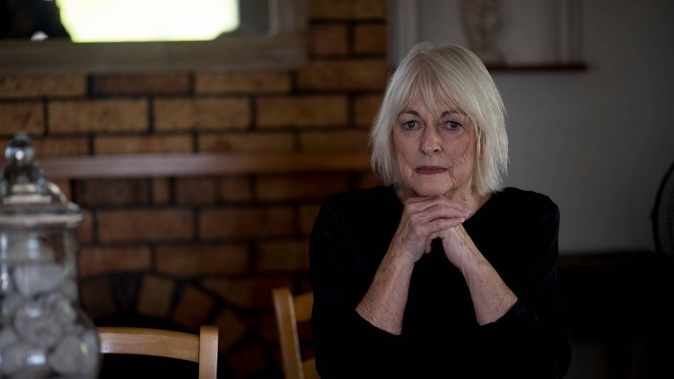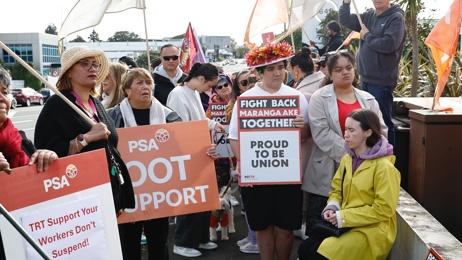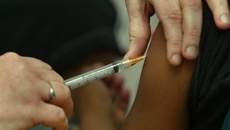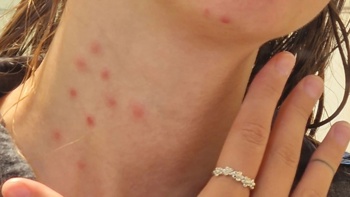
The use of surgical mesh to treat a common childbirth injury is now suspended in New Zealand because of safety concerns.
The extraordinary step, which follows a similar move in the United Kingdom, was announced today by Te Whatu Ora.
It is being celebrated by a woman who spearheaded a campaign to highlight the harrowing mesh injuries suffered by her and many other Kiwi women.
“It is an acknowledgement that their concerns were not just in their heads,” Sally Walker told the Herald. “It will give us some hope.”
About 100 women around the country who are on waiting lists for urogynaecological surgeries involving mesh are being contacted by doctors to tell them their operations for stress urinary incontinence are on hold.
The Director-General of Health Dr Diana Sarfati said the Surgical Mesh Roundtable (MRT), an oversight and monitoring group chaired by the Ministry of Health, had been investigating a “pause” since earlier this year.
The group’s assessment was that the balance of benefit and harm from the procedure would be improved by the series of additional measures already planned, and it recommended a pause until those measures were substantively in place.
“After considering the MRT’s assessment, I have decided to support a pause to allow the following steps to be put in place to reduce the harms linked to the procedure as much as possible,” said Sarfati.
The conditions require a series of safety measures to be met before mesh surgeries can resume, though exceptions are possible for some cases.
These steps include providing tailored training and certification for surgeons performing the procedure, establishing a registry of all public and private patients who could benefit from it, reviewing patients and the decision to carry out the procedure, and using a structured and guided informed consent process for patients.
Sarfarti said while the procedure had changed lives for many people for the better “we recognise it has caused ongoing pain and lessened the quality of life for some people, and we therefore need to act to minimise these outcomes”.
“We also acknowledge the process has been slow at times and that has potentially added to the frustrations of those who have suffered harm from surgical mesh.”
Sarfati said it was important to note the procedure was paused, not banned.
“That means there may be exceptions, and that the procedure might be carried out during the pause if a multi-disciplinary team agree there is no viable alternative. Any use would only happen after extensive consultation and review.”
She said while the pause might cause additional uncertainty for patients awaiting treatment, and concern for those who have recently had it, “We need to make sure that patients are given treatment that appropriately limits the risk of harm for as many people as possible, and we believe this move will help us achieve that”.
/cloudfront-ap-southeast-2.images.arcpublishing.com/nzme/5NKFYXK2R6TT2C3R2JTA3RWGW4.jpg)
The Director-General of Health, Dr Diana Sarfati, says the Surgical Mesh Roundtable, chaired by the Ministry of Health, has been investigating a “pause” since earlier this year. Photo / Jason Oxenham
The move will be controversial, not least because there are relatively few doctors in New Zealand who are trained to carry out stress urinary incontinence (SUI) operations without using mesh.
It comes after a petition to Parliament by Walker, a patient who was severely injured in a botched operation. Her story was first told last year in an expansive Herald investigation by former reporter Emma Russell highlighting this and other women’s health issues.
Walker’s petition urged a halt to the use of mesh to treat SUI, a common birth injury, until proper safeguards were in place.
After Te Whatu Ora’s announcement, Walker told the Herald she applauded them for recognising the serious harm of surgical mesh and for pausing the treatment.
“All along, this is why I did it: It has always been about women’s safety and that their choices were being taken away by the mesh,” Walker said.
“I’m really, really grateful now. It is such a big step after all the hard work. I’d like to thank all the people who have been behind me that have encouraged me, and especially my family.”
Some safeguards are already being implemented by the Ministry of Health. But the proposal for a halt to mesh operations, even temporarily, has been divisive.
Parliament’s Health Committee, in considering Walker’s petition, found there was no consensus among surgeons on whether a pause was needed.
In its final report in May, the committee stopped short of recommending a halt to mesh procedures and deferred to the ministry.
The Royal Australian and New Zealand College of Obstetricians and Gynaecologists (RANZCOG) told that committee that the benefits of mesh operations to the population as a whole outweighed the risks.
Those benefits included less pain, shorter hospitalisations, a faster return to activities and reduced cost when compared to historical treatments for severe incontinence.
A ban on mesh implants would remove the most commonly-used procedure worldwide for this condition, the college said. It also noted that mesh implants were the only option for some women.
After today’s directive, RANZCOG has advised its members to comply with the Director-General’s recommendations.
RANZCOG Aotearoa New Zealand committee Te Kāhui Oranga ō Nuku chair Dr Sue Fleming said: “RANZCOG is committed to rebuilding trust and confidence in the community by strengthening the health system supports for the use of mesh for stress urinary incontinence.
“We will work with members and patients to ensure they are informed and kept up-to-date of the latest developments.”
Fleming said SUI could have a significant impact on quality of life and urged anyone experiencing worrying symptoms to seek help. She also acknowledged the pain and distress suffered by Kiwi women who had experienced complications arising from pelvic mesh implants.
“A range of treatments are still available and where there are no other appropriate options, there is an exceptions process for the pause to allow surgical mesh,” Dr Fleming said.
“We emphasise the need for adequate communication with all stakeholders, and that any framework put in place – mandatory credentialling, a mesh registry, and an informed consent process – and its rollout - needs to be embedded in a supportive and learning culture, and one that focuses on the needs of women.”
The Royal Australasian College of Surgeons (RACS) has previously said it was neither for nor against the suspension of mesh procedures to treat SUI.
The RACS instead proposed a partial pause until the end of 2023 at the latest, during which implants could only be performed at specialist mesh centres by credentialled surgeons. This would “buy time” for improvements to the system, including a national register of mesh and pelvic surgeries.
In response to today’s directive, RACS spokesperson and Christchurch urologist Dr Sharon English said the College has been calling for improvements that need to be made regarding the implantation, assessment and reporting of stress urinary incontinence surgery.
“These include the credentialling of surgeons, creation of a pelvic floor registry, development of a structured informed consent process and establishment of regional multidisciplinary meetings.
“We see this as a win for patient safety and look forward to a resumption of the use of mesh sling to treat SUI within a solid safety system as soon as possible.”
English accepted some patients waiting for mesh procedures may be disappointed by the news. RACS will work with its members and their affected patients to ensure they are informed and kept up-to-date with the latest developments, she said.
The ministry has been making changes that were recommended by a Surgical Mesh Roundtable.
That includes a new national service to support women who have been injured by mesh implants, a credentialling process for surgeons carrying out mesh surgeries, and a national register to track mesh surgeries.
But a range of specialists, advocacy groups and watchdogs have raised concerns about the pace of implementation and the ongoing harm occurring.
The Health Qualify and Safety Commission and the Health and Disability Commissioner jointly raised concerns with the ministry in December.
The incidence of harm from mesh was difficult to quantify and report, but when it occurred the impact on patients was “significant, and in some cases permanent”, the two watchdogs said.
Complaints by patients harmed by mesh had increased since 2022, and ACC data also showed ongoing harm.
The two watchdogs made urgent recommendations, including an end to funding for mesh procedures unless they met robust standards - reviewed by a multidisciplinary team, carried out by recently-credentialled surgeons, and with clearly-documented, informed consent.
However, they did not go as far as suggesting a pause on mesh operations, saying health professionals believed a complete ban could lead to surgeons undertaking alternative procedures with higher complication rates.
The number of surgeons in New Zealand who meet a minimum standard for non-mesh procedures is believed to be very low.
The ministry is currently credentialing New Zealand surgeons for mesh procedures. The number of surgeons who qualified for the Tier 2 standard - which covers non-mesh procedures - is not known.
Scotland and England paused mesh implants for SUI in 2018 until a set of conditions to ensure patient safety were met.
Mesh is also used for other operations such as hernia repair in New Zealand but without the complications which have been observed in urogynaecological procedures.
Take your Radio, Podcasts and Music with you









